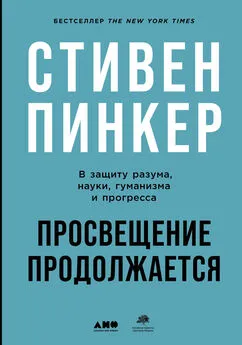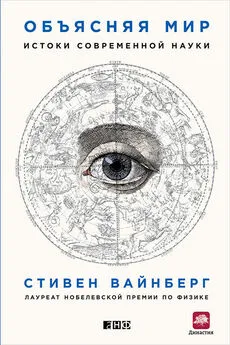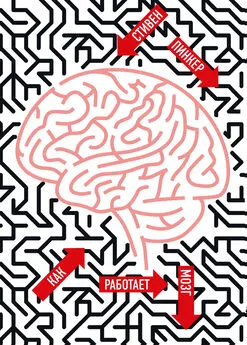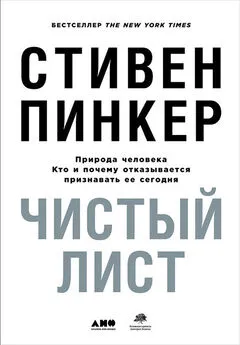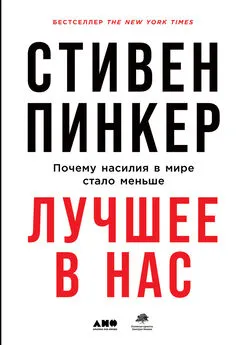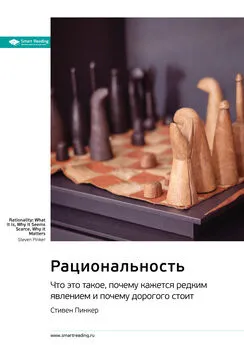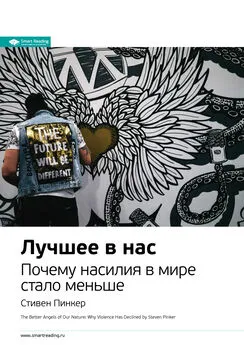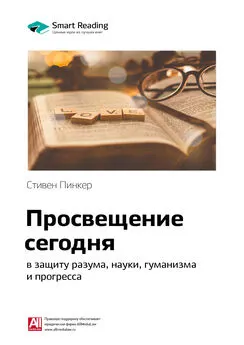Стивен Пинкер - Просвещение продолжается. В защиту разума, науки, гуманизма и прогресса
- Название:Просвещение продолжается. В защиту разума, науки, гуманизма и прогресса
- Автор:
- Жанр:
- Издательство:Альпина нон-фикшн
- Год:2021
- Город:Москва
- ISBN:9785001395362
- Рейтинг:
- Избранное:Добавить в избранное
-
Отзывы:
-
Ваша оценка:
Стивен Пинкер - Просвещение продолжается. В защиту разума, науки, гуманизма и прогресса краткое содержание
Этот прогресс – не случайность и не результат действия внешних сил. Это дар современному миру от деятелей Просвещения, которые первыми додумались, что знания можно использовать во имя процветания всего человечества. Идеи Просвещения – вовсе не наивные мечтания. Наоборот, они сработали – и это неоспоримый факт. Тем не менее именно сейчас эти идеи особенно нуждаются в нашей защите, поскольку противостоят характерным недостаткам человеческой природы – трайбализму, авторитаризму, демонизации чужаков и магическому мышлению, – которые так нравится эксплуатировать современным демагогам. Да, стоящие перед человечеством проблемы огромны, но все они решаемы, если мы, продолжая дело Просвещения, используем для этого разум, доверяем науке и руководствуемся идеалами гуманизма.
Особенности
Более 70 графиков из почти всех областей человеческой жизни.
Для кого
Для поклонников Стивена Пинкера. Для всех, кто интересуется природой человека. Для тех, кто верит в прогресс, и для тех, кто в нем сомневается.
Просвещение продолжается. В защиту разума, науки, гуманизма и прогресса - читать онлайн бесплатно ознакомительный отрывок
Интервал:
Закладка:
Nordhaus, T., & Shellenberger, M. 2011. The long death of environmentalism. The Breakthrough. https://thebreakthrough.org/issues/energy/the-long-death-of-environmentalism.
Nordhaus, T., & Shellenberger, M. 2013. How the left came to reject cheap energy for the poor: The great progressive reversal, part two. The Breakthrough . http://thebreakthrough.org/index.php/voices/michael-shellenberger-and-ted-nordhaus/the-great-progressive-reversal.
Nordhaus, W. 1974. Resources as a constraint on growth. American Economic Review, 64, 22–26.
Nordhaus, W. 1996. Do real utput and real age measures capture reality? The history of lighting suggests not. In T. F. Bresnahan & R. J. Gordon, eds., The economics of new goods . Chicago: University of Chicago Press.
Nordhaus, W. 2013. The climate casino: Risk, uncertainty, and economics for a warming world . New Haven: Yale University Press.
Norenzayan, A. 2015. Big gods: How religion transformed cooperation and conflict . Princeton, NJ: Princeton University Press.
Norman, A. 2016. Why we reason: Intention lignment and the genesis of human rationality. Biology and Philosophy, 31, 685–704.
Norris, P., & Inglehart, R. 2016. Populist uthoritarianism. https://www.electoralintegrityproject.com/populistauthoritarianism/.
North, D. C., Wallis, J. J., & Weingast, B. R. 2009. Violence and social orders: A conceptual framework for interpreting recorded human history . New York: Cambridge University Press.
Norvig, P. 2015. Ask not can machines think, ask how machines fit into the mechanisms we design. Edge . https://www.edge.org/response-detail/26055.
Nozick, R. 1974. Anarchy, state, and utopia . New York: Basic Books.
Nussbaum, M. 2000. Women and human development: The capabilities approach . New York: Cambridge University Press.
Nussbaum, M. 2008. Who is the happy warrior? Philosophy poses questions to psychology. Journal of Legal Studies, 37, 81–113.
Nussbaum, M. 2016. Not for profit: Why democracy needs the humanities (updated ed.). Princeton, NJ: Princeton University Press.
Nyhan, B. 2013. Building a better correction. Columbia Journalism Review, http://archives.cjr.org/united_states_project/building_a_better_correction_nyhan_new_misperception_research.php.
Ó Gráda, C. 2009. Famine: A short history . Princeton, NJ: Princeton University Press.
O’Neill, S., & Nicholson ole, S. 2009. “Fear won’t do it”: Promoting positive engagement with climate change through visual and iconic representations. Science Communication, 30, 355–79.
O’Neill, W. L. 1989. American high: The years of confidence, 1945–1960 . New York: Simon & Schuster. OECD. 1985. Social expenditure 1960–1990: Problems of growth and control . Paris: OECD Publishing. OECD. 2014. Social expenditure update – social spending is falling in some countries, but in many others it remains at historically high levels. www.oecd.org/social/expenditure.htm.
OECD. 2015a. Education at a glance 2015: OECD indicators . Paris: OECD Publishing.
OECD. 2015b. Suicide rates. https://data.oecd.org/healthstat/suicide-rates.htm.
OECD. 2016. Income distribution and poverty. http://stats.oecd.org/Index.aspx?DataSetCode=IDD.
OECD. 2017. Social expenditure: Aggregated data. http://stats.oecd.org/Index.aspx?datasetcode=SOCXAGG.
Oeppen, J., & Vaupel, J. W. 2002. Broken limits to life expectancy. Science, 296, 1029–31.
Oesterdiekhoff, G. W. 2015. The nature of the “premodern” mind: Tylor, Frazer, Lévy ruhl, Evans Pritchard, Piaget, and beyond. Anthropos, 110, 15–25.
Office for National Statistics. 2016. UK environmental accounts: How much material is the UK consuming? https://bit.ly/2WV8Git.
Office for National Statistics. 2017. Homicide. https://www.ons.gov.uk/peoplepopulationandcommunity/crimeandjustice/compendium/focusonviolentcrimeandsexualoffences/yearendingmarch2016/homicide.
Ohlander, J. 2010. The decline of suicide in Sweden, 1950–2000. Ph.D. dissertation, Pennsylvania State University.
Olfson, M., Druss, B. G., & Marcus, S. C. 2015. Trends in mental health care among children and adolescents. New England Journal of Medicine, 372, 2029–38.
Omohundro, S. M. 2008. The basic AI drives. In P. Wang, B. Goertzel, & S. Franklin, eds., Artificial general intelligence 2008: Proceedings of the first AGI conference . Amsterdam: IOS Press.
Oreskes, N., & Conway, E. 2010. Merchants of doubt: How a handful of scientists obscured the truth on issues from tobacco smoke to global warming . New York: Bloomsbury Press.
Ortiz-Ospina, E., Lee, L., & Roser, M. 2016. Suicide. Our World in Data . https://ourworldindata.org/suicide/.
Ortiz-Ospina, E., & Roser, M. 2016a. Child labor. Our World in Data . https://ourworldindata.org/child-labor/.
Ortiz-Ospina, E., & Roser, M. 2016b. Public spending. Our World in Data . https://ourworldindata.org/public-spending/.
Ortiz-Ospina, E., & Roser, M. 2016c. Trust. Our World in Data . https://ourworldindata.org/trust/.
Ortiz-Ospina, E., & Roser, M. 2016d. World population growth. Our World in Data . https://ourworldindata.org/world-population-growth/.
Osgood, C. E. 1962. An alternative to war or surrender . Urbana: University of Illinois Press.
Otieno, C., Spada, H., & Renkl, A. 2013. Effects of news frames on perceived risk, emotions, and learning. PLOS ONE, 8, 1–12.
Otterbein, K. F. 2004. How war began . College Station: Texas A&M University Press.
Ottosson, D. 2006. LGBT world legal wrap up survey . Brussels: International Lesbian and Gay Association.
Ottosson, D. 2009. State ponsored homophobia . Brussels: International Lesbian, Gay, Bisexual, Trans, and Intersex Association.
Pacala, S., & Socolow, R. 2004. Stabilization wedges: Solving the climate problem for the next 50 years with current technologies. Science, 305, 968–72.
Pagden, A. 2013. The Enlightenment: And why it still matters . New York: Random House.
Pagel, M. 2015. Machines that can think will do more good than harm. Edge . https://www.edge.org/response-detail/26038.
Paine, T. 1778/2016. Thomas Paine ultimate collection: Political works, philosophical writings, speeches, letters and biography . Prague: e-artnow.
Papineau, D. 2015. Naturalism. In E. N. Zalta, ed., Stanford Encyclopedia of Philosophy . https://plato.stanford.edu/entries/naturalism/.
Parachini, J. 2003. Putting WMD terrorism into perspective. Washington Quarterly, 26, 37–50.
Parfit, D. 1997. Equality and priority. Ratio, 10, 202–21.
Parfit, D. 2011. On what matters . New York: Oxford University Press.
Patel, A. 2008. Music, language, and the brain . New York: Oxford University Press.
Patterson, O. 1985. Slavery and social death . Cambridge, MA: Harvard University Press.
Paul, G. S. 2009. The chronic dependence of popular religiosity upon dysfunctional psychosociological conditions. Evolutionary Psychology, 7, 398–441.
Paul, G. S. 2014. The health of nations. Skeptic, 19, 10–16.
Paul, G. S., & Zuckerman, P. 2007. Why the gods are not winning. Edge . https://www.edge.org/conversation/gregory_paul-phil_zuckerman-why-the-gods-are-not-winning.
Payne, J. L. 2004. A history of force: Exploring the worldwide movement against habits of coercion, bloodshed, and mayhem . Sandpoint, ID: Lytton Publishing.
Payne, J. L. 2005. The prospects for democracy in high iolence societies. Independent Review, 9, 563–72.
PBL Netherlands Environmental Assessment Agency. (Undated.) History database of the global environment: Population. http://themasites.pbl.nl/tridion/en/themasites/hyde/basicdrivingfactors/population/index-2.html.
Pegula, S., & Janocha, J. 2013. Death on the job: Fatal work injuries in 2011. Beyond the Numbers, 2 (22). http://www.bls.gov/opub/btn/volume-2/death-on-the-job-fatal-work-injuries-in-2011.htm.
Pelham, N. 2016. Holy lands: Reviving pluralism in the Middle East . New York: Columbia Global Reports.
Pentland, A. 2007. The human nervous system has come alive. Edge . https://www.edge.org/response-detail/11497.
Perlman, J. E. 1976. The myth of marginality: Urban poverty and politics in Rio de Janeiro . Berkeley: University of California Press.
Peterson, M. B. 2015. Evolutionary political psychology: On the origin and structure of heuristics and biases in politics. Advances in Political Psychology, 36, 45–78.
Pettersson, T., & Wallensteen, P. 2015. Armed conflicts, 1946–2014. Journal of Peace Research, 52, 536–50.
Pew Research Center. 2010. Gender equality universally embraced, but inequalities acknowledged . Washington: Pew Research Center.
Pew Research Center. 2012a. The global religious landscape . Washington: Pew Research Center.
Pew Research Center. 2012b. Trends in American values, 1987–2012 . Washington: Pew Research Center. Pew
Research Center. 2012c. The world’s Muslims: Unity and diversity . Washington: Pew Research Center.
Pew Research Center. 2013. The world’s Muslims: Religion, politics, and society . Washington: Pew Re-search Center.
Pew Research Center. 2014. Political polarization in the American public . Washington: Pew Research Center.
Pew Research Center. 2015a. America’s changing religious landscape . Washington: Pew Research Center.
Pew Research Center. 2015b. Views about climate change, by education and science knowledge. Washington: Pew Research Center.
Phelps, E. A. 2013. Mass flourishing: How grassroots innovation created jobs, challenge, and change . Princeton, NJ: Princeton University Press.
Phillips, J. A. 2014. A changing epidemiology of suicide? The influence of birth cohorts on suicide rates in the United States. Social Science and Medicine, 114, 151–60.
Pietschnig, J., & Voracek, M. 2015. One century of global IQ gains: A formal meta nalysis of the Flynn effect (1909–2013). Perspectives in Psychological Science, 10, 282–306.
Piketty, T. 2013. Capital in the twenty-first century . Cambridge, MA: Harvard University Press.
Pinker, S. 1994/2007. The language instinct. New York: HarperCollins.
Pinker, S. 1997/2009. How the mind works. New York: Norton.
Pinker, S. 1999/2011. Words and rules: The ingredients of language . New York: HarperCollins.
Pinker, S. 2002/2016. The blank slate: The modern denial of human nature . New York: Penguin.
Pinker, S. 2005. The evolutionary psychology of religion. Freethought Today . https://ffrf.org/about/getting-acquainted/item/13184-the-evolutionary-psychology-of-religion.
Pinker, S. 2006. Preface to “What is your dangerous idea?” Edge . https://www.edge.org/conversation/steven_pinker-preface-to-dangerous-ideas.
Pinker, S. 2007a. The stuff of thought: Language as a window into human nature . New York: Penguin.
Pinker, S. 2007b. Toward a consilient study of literature: Review of J. Gottschall & D. S. Wilson’s “The literary animal: Evolution and the nature of narrative.” Philosophy and Literature, 31, 161–77.
Pinker, S. 2008a. The moral instinct. New York Times Magazine, January 13.
Читать дальшеИнтервал:
Закладка:
